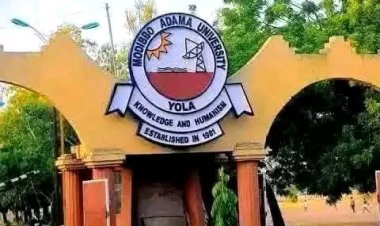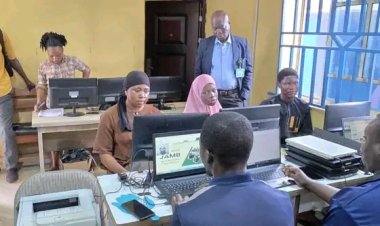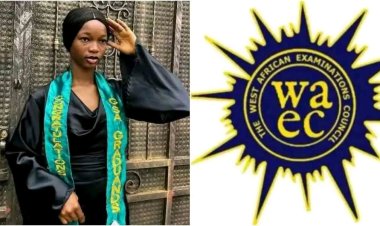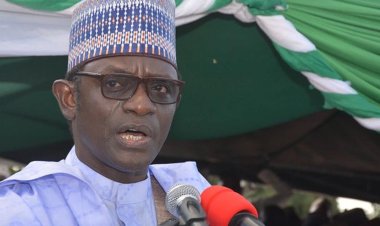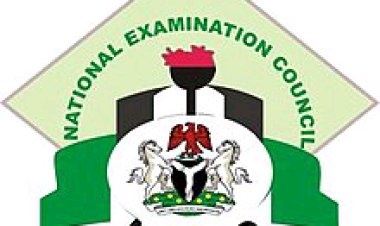AE-FUNAI Scientists Call For Efficient Management of Environmental Impact of Mining Sites in Nigeria
Scientists under the aegis of Environmental Process and Forensic Research Group (ENPROFORG), Alex Ekwueme Federal University Ndufu-Alike, Ebonyi State, have called for efficient management of environmental impact of mining sites in Nigeria.

Scientists under the aegis of Environmental Process and Forensic Research Group (ENPROFORG), Alex Ekwueme Federal University Ndufu-Alike, Ebonyi State, have called for efficient management of environmental impact of mining sites in Nigeria.

Myschoolnews reports the Scientists made the call during a one-day symposium and stakeholders meeting themed “Role of Environmental Forensics in the Efficient Management of Environmental Impacts of Mining in Nigeria”, held at the mini auditorium, NEEDS Assessment Building of the University.
The group which based its work on samples collected from many mining deposits across the country decried the non-compliance to environmental impact assessment in mining sites across the country, even as they also x-rayed the processes of mineral extraction, refining, circulation and usage as well as the benefits and implications of the mining activities.
While making his opening remarks at the symposium, the Principal Investigator of ENPROFORG, Dr. Peter C. Okoli said the symposium was a formal discussion and agenda setting on the need to structure some of the thoughts and knowledge of stakeholders with the aim of having an efficient management of environmental impacts of mining in Nigeria.
He further thanked the Vice- Chancellor of the University, Prof. Sunday Elom for his support through which the project was sponsored by TETFUND.
In his address, the Head, Department of Chemistry, Prof. Nwabueze Elom pointed out the importance of research on the environment, going by its indispensable value, stating that the symposium will go a long way in attracting more research grants from the federal government and donor agencies.
He further solicited for more commitment on projects of this kind.
While declaring the event open, the Vice-Chancellor, Prof. Elom, represented by the Deputy Vice- Chancellor, Administration, Prof. Abel Ezeoha, expressed gladness and thanked the Department of Chemistry for making the University proud through ENPROFORG.
He reiterated the decision of the Vice-Chancellor to use the human resource at the disposal of the institution to ensure the progress of the society in order to mitigate the inadequacies in the mining sector with the hope that things would get better in the country, especially in the University system.
Rep. of VC, Prof. Abel Ezeoha declaring the symposium open
During the plenary session, Prof. Amobi Ekwe in a presentation titled: “Mining of Solid Minerals- Economic Benefits and the Environmental Conundrum”, defined Mineral as a naturally-occurring inorganic solid materials with a characteristic chemical composition and a crystalline structure.
He said economic development is significantly influenced by mining with numerous economic, environmental and social issues that have also been linked to it, raising concerns about the sustainability of the mining’s economic benefits.
Prof. Ekwe further noted that in order to overcome the problems, the industry must lessen its negative effects on the environment, society, culture, health, and human development, as well as on governance and macroeconomic management.
Speaking on “Impediments to implementation of Polluter-Pays Principle in Nigeria’s Extractive Industry”, Dr Onyekachi Eni who also is the Acting Dean, Faculty of Law, said the Polluter-Pays Principle (PPP) which was created and credited to British economist in 1920 is a system where the polluter is held responsible for clean up. He said the principle was inculcated as an environmental and legal tool in 1972 in Brazil.
The Principal Investigator, Dr. Okoli during his presentation titled; “Chemistry in Court Room-Isotope Finger Printing as Forensic Tool for Managing Environmental Pollution in Nigeria”, described the challenges of environmental forensics in Nigeria as a serious setback to proper utilization of the mineral resources in the country. He cited cases of environmental pollution in the various mining sites in Ikwo and Enyigba in Ebonyi State, coal mining sites in Enugu state and gold mining sites in Zamfara state.
He noted that mining companies are only interested in mining mineral resources without considering the health hazards and risks associated with the mining activities as there are no mitigation policies aimed at reclaiming the mining sites.
He further stated that it is usually difficult to hold a mining company responsible for a particular environmental pollution as the companies channel their waste products far away from the mining sites which makes it difficult for initialization of compensation.
Based on this ugly development, Dr. Okoli stressed that the environmental pollutions can only be mitigated by the use of ISOTOPE finger printing as a forensic tool for the management of environmental pollution through the samples collected from different mining sites.
He therefore recommended the development of Isotope finger printing for forensic test

 Emmanuel Eze
Emmanuel Eze 